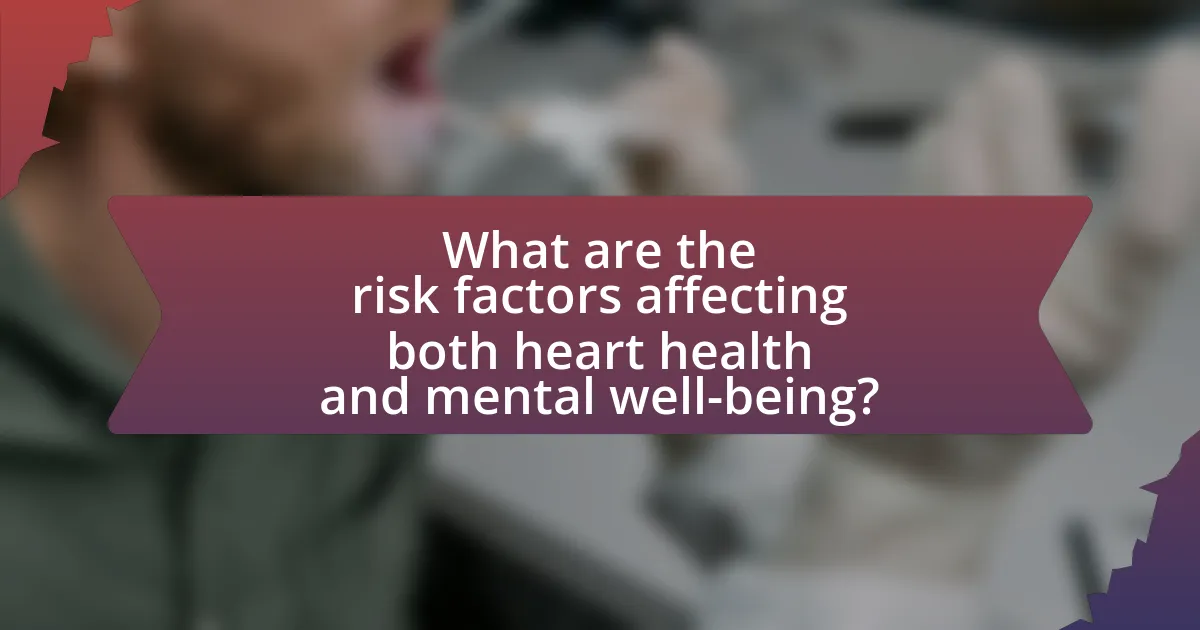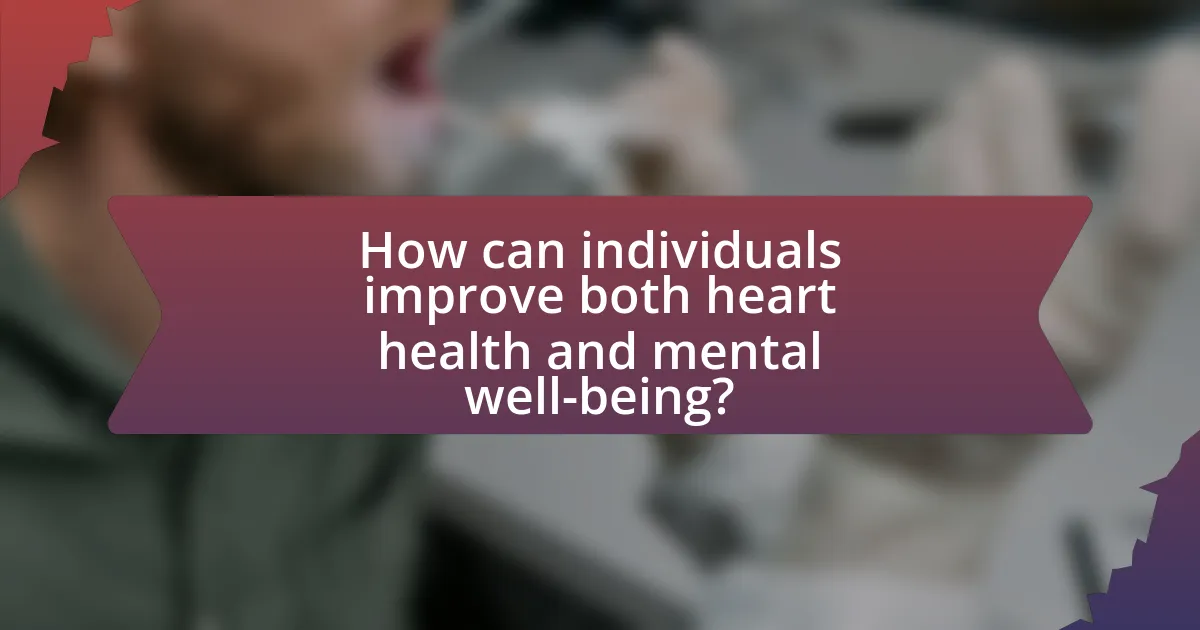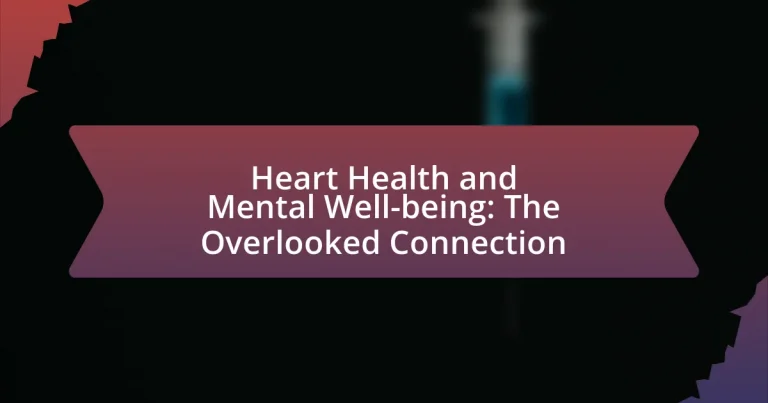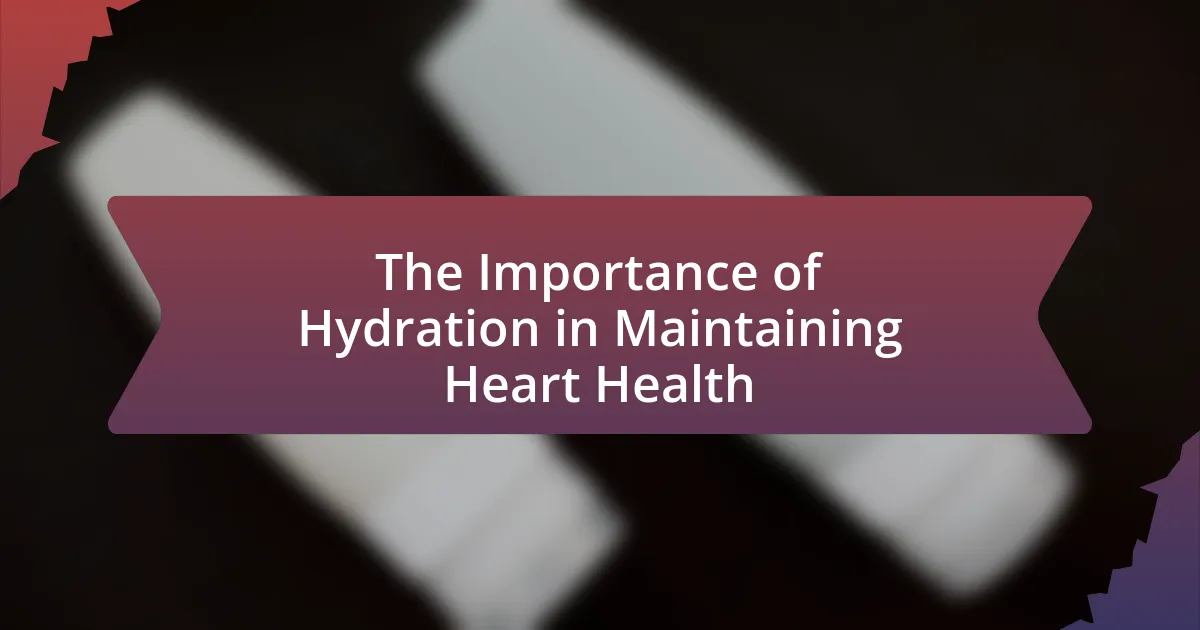The article explores the critical connection between heart health and mental well-being, emphasizing how poor cardiovascular health can lead to increased rates of anxiety and depression, and vice versa. It discusses the bidirectional relationship between these two aspects, highlighting physiological mechanisms such as inflammation and neuroendocrine responses that link them. Additionally, the article addresses common misconceptions, societal stigma, and risk factors affecting both heart health and mental well-being, while providing practical strategies for improving overall health through lifestyle choices, stress management, and social support.

What is the connection between heart health and mental well-being?
Heart health and mental well-being are interconnected, as poor cardiovascular health can lead to increased rates of anxiety and depression. Research indicates that individuals with heart disease are more likely to experience mental health issues due to the stress and lifestyle changes associated with their condition. For example, a study published in the Journal of the American College of Cardiology found that patients with heart failure had a significantly higher prevalence of depression compared to the general population, highlighting the bidirectional relationship between these two aspects of health.
How do heart health and mental well-being influence each other?
Heart health and mental well-being significantly influence each other, as poor cardiovascular health can lead to increased rates of anxiety and depression, while mental health issues can contribute to heart disease. Research indicates that individuals with heart disease are at a higher risk of developing depression, with studies showing that approximately 30% of heart disease patients experience depressive symptoms. Conversely, mental health disorders can lead to behaviors such as poor diet, lack of exercise, and smoking, which are risk factors for heart disease. This bidirectional relationship highlights the importance of addressing both physical and mental health in treatment and prevention strategies.
What physiological mechanisms link heart health to mental health?
Heart health is linked to mental health through several physiological mechanisms, including the impact of inflammation, neuroendocrine responses, and the autonomic nervous system. Inflammation, often associated with cardiovascular diseases, can affect brain function and mood regulation, leading to conditions such as depression and anxiety. Elevated levels of inflammatory markers, such as C-reactive protein, have been correlated with increased risk of mental health disorders.
Additionally, the neuroendocrine system, which regulates hormones like cortisol, plays a crucial role in the stress response. Chronic stress can lead to elevated cortisol levels, negatively impacting both heart health and mental well-being. This relationship is supported by studies showing that individuals with cardiovascular disease often experience higher rates of anxiety and depression.
Furthermore, the autonomic nervous system, which controls heart rate and blood pressure, also influences emotional states. Dysregulation of this system can lead to both cardiovascular issues and mental health problems, as evidenced by research indicating that lower heart rate variability is associated with increased anxiety and depression. These interconnected mechanisms highlight the complex relationship between heart health and mental health.
How do stress and anxiety impact heart health?
Stress and anxiety negatively impact heart health by increasing heart rate and blood pressure, which can lead to cardiovascular diseases. Chronic stress triggers the release of hormones like cortisol and adrenaline, causing inflammation and damage to blood vessels. Research indicates that individuals with high levels of stress and anxiety are at a greater risk for heart attacks and strokes, with studies showing that stress can increase the likelihood of developing heart disease by 40%.
Why is this connection often overlooked?
The connection between heart health and mental well-being is often overlooked due to a lack of awareness about their interdependence. Many individuals and healthcare professionals primarily focus on physical symptoms of heart disease while neglecting the psychological factors that can influence heart health, such as stress, anxiety, and depression. Research indicates that individuals with mental health disorders are at a higher risk for cardiovascular diseases, yet this relationship is frequently not addressed in clinical settings. For instance, a study published in the Journal of the American College of Cardiology found that depression significantly increases the risk of heart disease, highlighting the need for integrated approaches to treatment that consider both mental and physical health.
What common misconceptions exist about heart health and mental well-being?
Common misconceptions about heart health and mental well-being include the belief that mental health issues do not affect physical health and that heart disease is solely a result of lifestyle choices. Research indicates that mental health conditions, such as depression and anxiety, can significantly increase the risk of heart disease due to factors like inflammation and stress hormones. Additionally, the American Heart Association states that individuals with depression are more likely to develop heart disease, highlighting the interconnectedness of these two aspects of health.
How does societal stigma affect the recognition of this connection?
Societal stigma significantly hinders the recognition of the connection between heart health and mental well-being. This stigma often leads to the marginalization of individuals experiencing mental health issues, causing them to avoid seeking help or discussing their conditions. For instance, research published in the Journal of the American College of Cardiology indicates that individuals with depression are less likely to receive appropriate cardiovascular care due to perceived stigma, which can exacerbate both mental and physical health problems. Consequently, the lack of open dialogue and understanding surrounding mental health issues prevents a holistic approach to treatment, thereby obscuring the critical link between mental well-being and heart health.

What are the risk factors affecting both heart health and mental well-being?
The risk factors affecting both heart health and mental well-being include obesity, physical inactivity, smoking, excessive alcohol consumption, and chronic stress. Obesity is linked to increased inflammation and metabolic syndrome, which negatively impacts both cardiovascular health and mental health, as evidenced by studies showing higher rates of depression in obese individuals. Physical inactivity contributes to cardiovascular disease and is associated with higher levels of anxiety and depression. Smoking is a known risk factor for heart disease and has been shown to exacerbate mental health issues, including anxiety and depression. Excessive alcohol consumption can lead to hypertension and heart disease while also increasing the risk of mood disorders. Chronic stress affects the body’s cardiovascular system and is a significant contributor to anxiety and depression, as highlighted in research that connects stress with both heart disease and mental health disorders.
Which lifestyle choices contribute to both heart disease and mental health issues?
Poor dietary habits, physical inactivity, smoking, and excessive alcohol consumption contribute to both heart disease and mental health issues. Diets high in saturated fats, sugars, and processed foods are linked to increased risk of cardiovascular problems and can exacerbate conditions like depression and anxiety. Lack of physical activity is associated with obesity, which is a significant risk factor for heart disease and is also correlated with poorer mental health outcomes. Smoking negatively impacts cardiovascular health and is linked to higher rates of anxiety and depression. Additionally, excessive alcohol consumption can lead to hypertension and heart disease while also increasing the risk of mood disorders. These lifestyle choices create a detrimental cycle affecting both physical and mental health.
How does diet impact both heart health and mental well-being?
Diet significantly impacts both heart health and mental well-being by influencing inflammation, cholesterol levels, and neurotransmitter function. A diet rich in fruits, vegetables, whole grains, and healthy fats, such as the Mediterranean diet, has been shown to reduce the risk of cardiovascular diseases and improve mood and cognitive function. For instance, a study published in the American Journal of Psychiatry found that individuals adhering to a Mediterranean diet had a 30% lower risk of depression. Additionally, omega-3 fatty acids, found in fish, have been linked to lower rates of heart disease and improved mental health outcomes, as they play a crucial role in brain function and mood regulation. Thus, dietary choices directly affect both cardiovascular health and psychological well-being through biochemical pathways and lifestyle factors.
What role does physical activity play in maintaining both heart and mental health?
Physical activity plays a crucial role in maintaining both heart and mental health by improving cardiovascular function and enhancing mood. Regular exercise strengthens the heart muscle, lowers blood pressure, and improves circulation, which collectively reduce the risk of heart disease. Additionally, physical activity stimulates the release of endorphins and other neurotransmitters, which can alleviate symptoms of anxiety and depression. Research indicates that individuals who engage in regular physical activity experience a 20-30% reduction in the risk of developing heart disease and a significant improvement in mental health outcomes, as evidenced by studies published in journals such as the American Journal of Preventive Medicine.
What psychological factors can exacerbate heart health problems?
Psychological factors such as chronic stress, anxiety, depression, and social isolation can exacerbate heart health problems. Chronic stress leads to elevated levels of cortisol, which can increase blood pressure and heart rate, contributing to cardiovascular disease. Anxiety and depression are linked to unhealthy lifestyle choices, such as poor diet and lack of exercise, which further increase heart disease risk. Additionally, social isolation can lead to increased stress and depression, creating a cycle that negatively impacts heart health. Research indicates that individuals with depression have a 64% higher risk of developing heart disease, highlighting the significant connection between mental well-being and cardiovascular health.
How does depression influence cardiovascular health?
Depression negatively influences cardiovascular health by increasing the risk of heart disease and related conditions. Research indicates that individuals with depression are 1.5 to 2 times more likely to develop coronary artery disease compared to those without depression. This correlation is attributed to several factors, including increased inflammation, elevated stress hormones, and unhealthy lifestyle choices often associated with depression, such as poor diet and lack of exercise. Additionally, depression can lead to poor adherence to medical treatments, further exacerbating cardiovascular issues.
What is the impact of chronic stress on heart disease risk?
Chronic stress significantly increases the risk of heart disease. Prolonged exposure to stress hormones, such as cortisol, can lead to inflammation, high blood pressure, and unhealthy lifestyle choices, all of which are risk factors for cardiovascular disease. Research indicates that individuals experiencing chronic stress are more likely to develop heart-related issues, with studies showing that stress can contribute to a 40% increase in the risk of heart disease.

How can individuals improve both heart health and mental well-being?
Individuals can improve both heart health and mental well-being by engaging in regular physical activity, maintaining a balanced diet, managing stress, and fostering social connections. Regular exercise, such as 150 minutes of moderate aerobic activity weekly, has been shown to lower the risk of heart disease and enhance mood by releasing endorphins. A balanced diet rich in fruits, vegetables, whole grains, and healthy fats supports cardiovascular health and can reduce symptoms of anxiety and depression. Stress management techniques, including mindfulness and meditation, have been linked to lower blood pressure and improved emotional resilience. Additionally, strong social connections contribute to better heart health and mental well-being, as studies indicate that social support can reduce the risk of heart disease and improve overall mental health outcomes.
What practical steps can be taken to enhance heart health and mental well-being simultaneously?
Engaging in regular physical activity, such as aerobic exercises, can significantly enhance both heart health and mental well-being. Studies indicate that aerobic exercise improves cardiovascular fitness and reduces symptoms of anxiety and depression. For instance, a meta-analysis published in the journal “Psychosomatic Medicine” found that individuals who participated in regular aerobic exercise experienced a 20-30% reduction in depressive symptoms. Additionally, adopting a heart-healthy diet rich in fruits, vegetables, whole grains, and omega-3 fatty acids supports cardiovascular health while also positively influencing mood and cognitive function. Research from the “American Journal of Clinical Nutrition” highlights that diets high in omega-3s are associated with lower rates of depression. Furthermore, practicing mindfulness and stress-reduction techniques, such as yoga or meditation, can lower blood pressure and improve emotional regulation, thereby benefiting both heart health and mental well-being. A study in “JAMA Internal Medicine” demonstrated that mindfulness meditation can lead to significant reductions in stress and anxiety, which are risk factors for heart disease.
How can mindfulness and stress management techniques benefit heart health?
Mindfulness and stress management techniques can significantly benefit heart health by reducing stress-related cardiovascular risks. Chronic stress is linked to increased blood pressure, heart rate, and inflammation, all of which can lead to heart disease. Research published in the Journal of the American College of Cardiology indicates that mindfulness practices, such as meditation and deep breathing, can lower blood pressure and improve heart rate variability, which are indicators of cardiovascular health. Additionally, a study by the American Heart Association found that individuals who engage in regular stress management techniques experience lower levels of cortisol, a hormone associated with stress that can negatively impact heart health.
What dietary changes can support both heart and mental health?
Incorporating a diet rich in omega-3 fatty acids, fruits, vegetables, whole grains, and nuts can support both heart and mental health. Omega-3 fatty acids, found in fatty fish like salmon and walnuts, have been shown to reduce inflammation and lower the risk of heart disease while also improving mood and cognitive function. A study published in the Journal of the American College of Cardiology found that individuals consuming higher amounts of fruits and vegetables had a lower risk of cardiovascular disease and improved mental well-being. Whole grains and nuts provide essential nutrients that contribute to heart health and have been linked to better mental health outcomes, as evidenced by research in the American Journal of Psychiatry, which indicates that diets high in these foods are associated with a reduced risk of depression.
What role does social support play in maintaining heart health and mental well-being?
Social support plays a crucial role in maintaining heart health and mental well-being by reducing stress and promoting healthy behaviors. Research indicates that individuals with strong social networks experience lower levels of anxiety and depression, which are linked to cardiovascular diseases. For instance, a study published in the Journal of the American College of Cardiology found that social isolation is associated with a 29% increased risk of heart disease. Additionally, social support encourages adherence to medical advice and lifestyle changes, such as regular exercise and a balanced diet, which are essential for heart health. Thus, the presence of supportive relationships contributes significantly to both emotional resilience and physical health outcomes.
How can community engagement improve overall health outcomes?
Community engagement can improve overall health outcomes by fostering social connections, enhancing access to resources, and promoting health education. Research indicates that individuals who are actively engaged in their communities experience lower rates of chronic diseases and improved mental health. For instance, a study published in the American Journal of Public Health found that community involvement is linked to increased physical activity and better dietary habits, which are crucial for heart health. Additionally, engaged communities often have better access to healthcare services and support systems, leading to timely interventions and improved health literacy. These factors collectively contribute to enhanced health outcomes across populations.
What are the benefits of seeking professional help for mental health issues?
Seeking professional help for mental health issues provides individuals with access to expert guidance, effective treatment options, and a supportive environment for recovery. Professional mental health practitioners, such as psychologists and psychiatrists, utilize evidence-based therapies, like cognitive-behavioral therapy, which has been shown to reduce symptoms of anxiety and depression in 60-80% of patients. Additionally, therapy can help individuals develop coping strategies, improve emotional regulation, and enhance overall well-being. Research indicates that individuals who engage in therapy report higher levels of life satisfaction and improved interpersonal relationships, further validating the benefits of seeking professional assistance for mental health challenges.
What are some effective strategies for integrating heart health and mental well-being practices into daily life?
Effective strategies for integrating heart health and mental well-being practices into daily life include regular physical activity, balanced nutrition, mindfulness practices, and social connections. Engaging in at least 150 minutes of moderate aerobic exercise weekly can improve cardiovascular health and reduce symptoms of anxiety and depression. A diet rich in fruits, vegetables, whole grains, and healthy fats, such as the Mediterranean diet, has been shown to lower heart disease risk and enhance mood. Mindfulness practices, such as meditation and deep-breathing exercises, can reduce stress and improve emotional regulation, contributing to both heart and mental health. Additionally, maintaining strong social connections has been linked to lower blood pressure and improved mental health outcomes, as social support can buffer stress and promote overall well-being.





